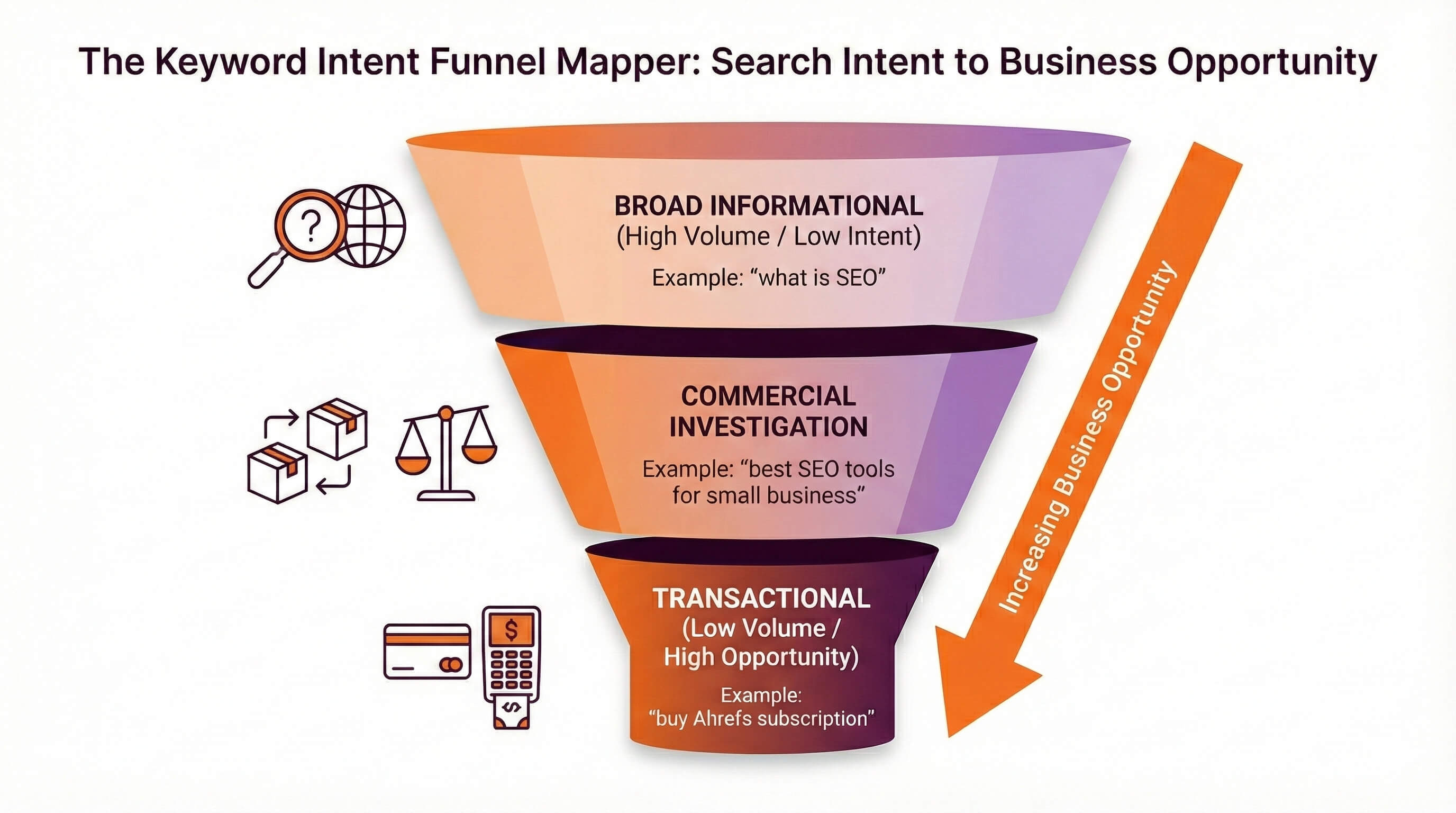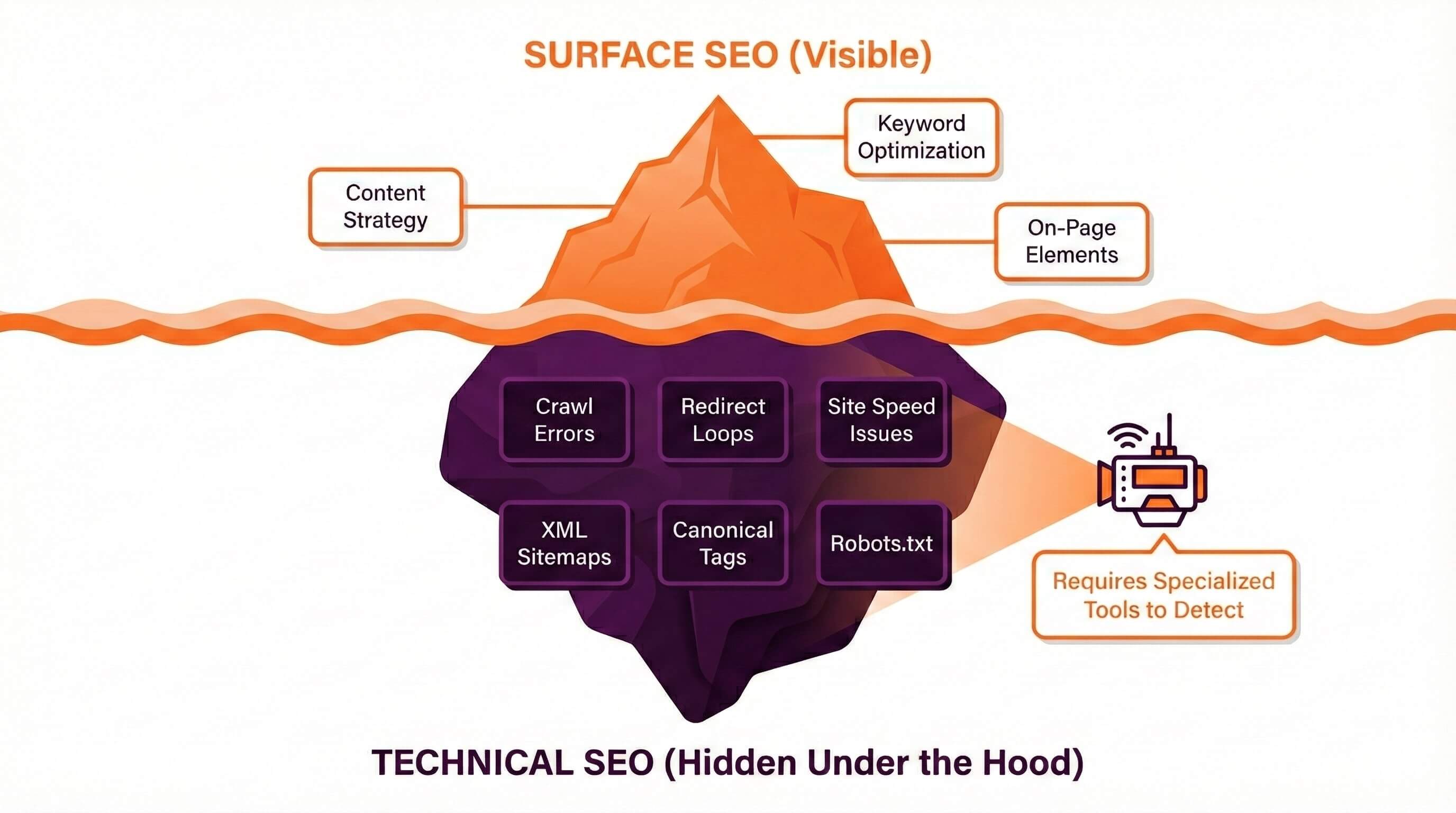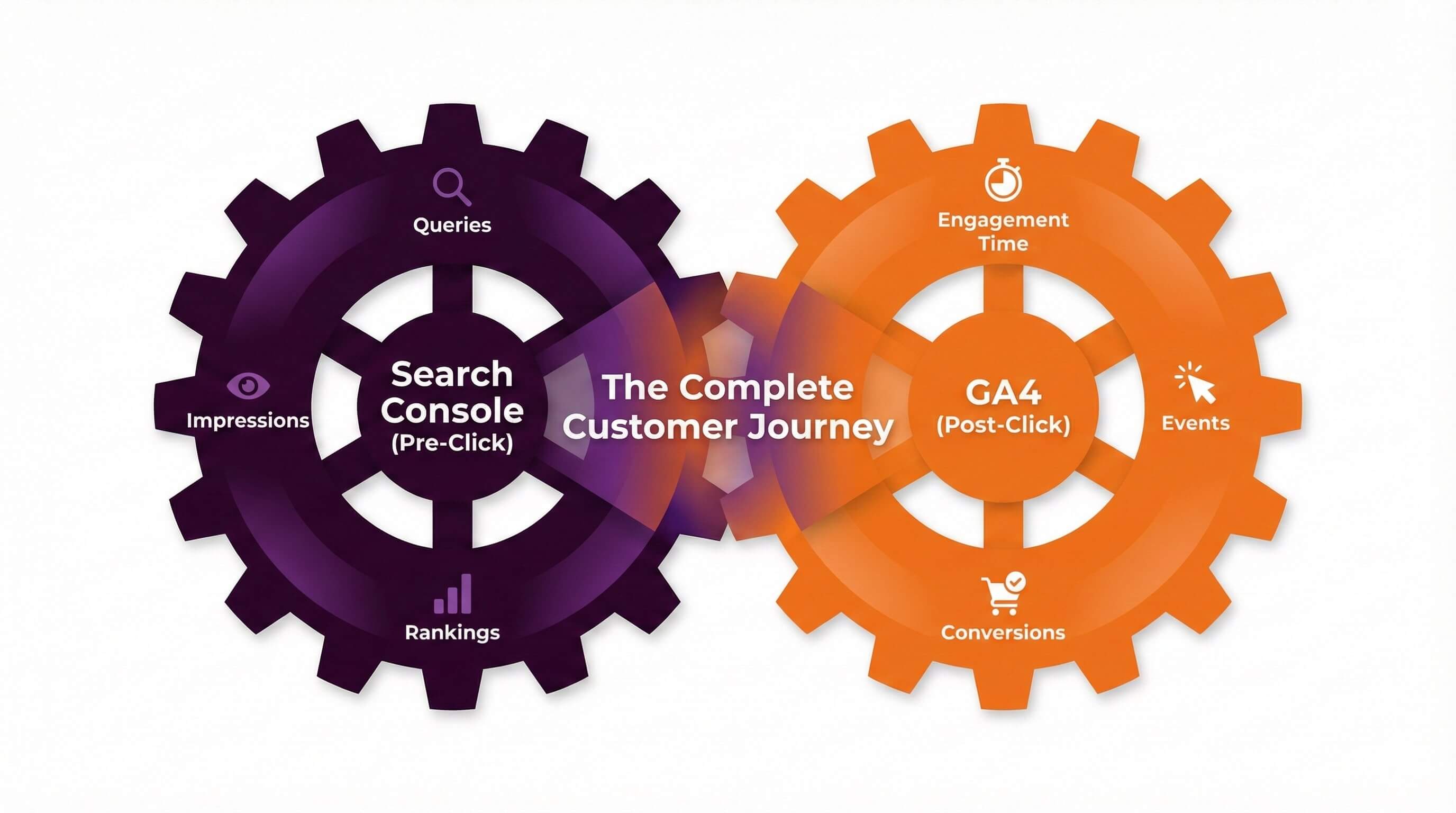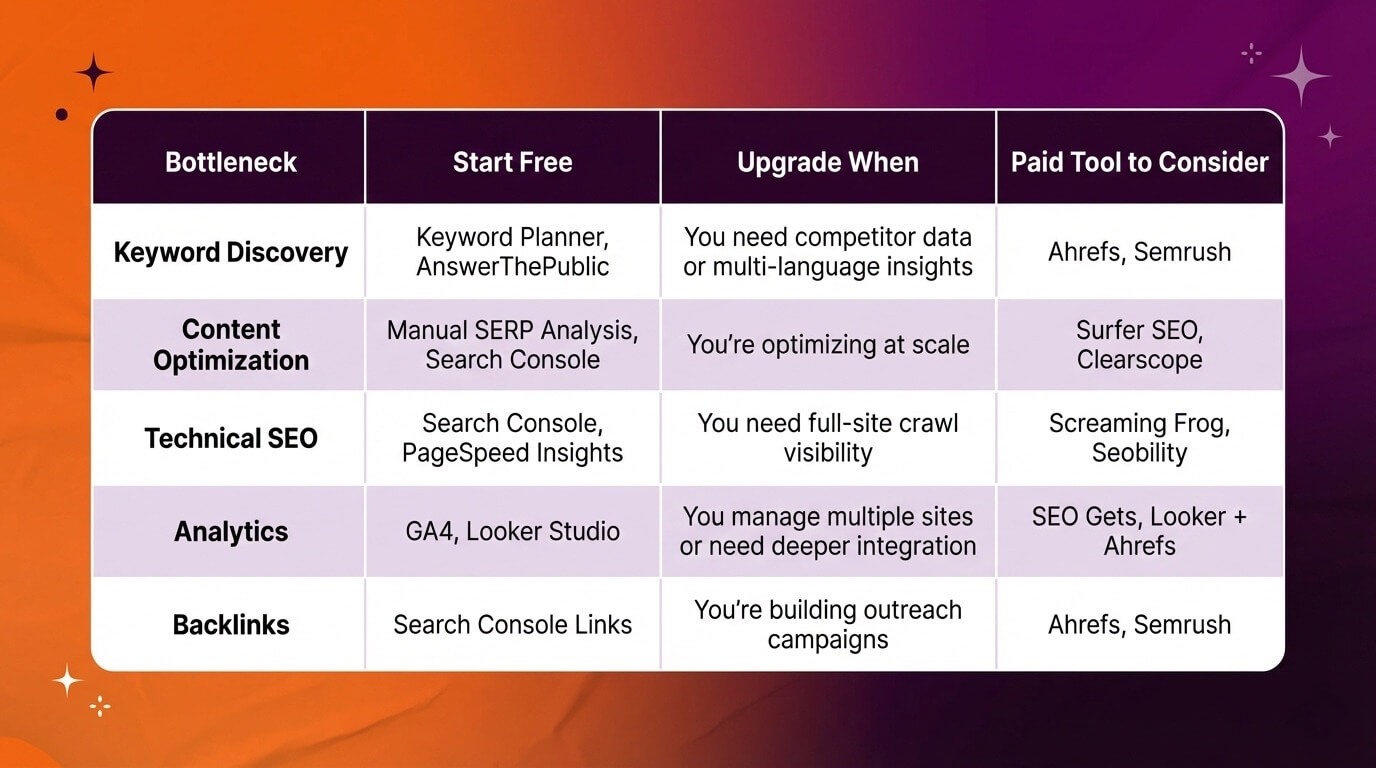
All SEO Tools You Need to Overcome Your Top Growth Constraints
If you've spent more time comparing SEO tools than actually using them, you're not alone. Most teams buy software reactively, after seeing a competitor mention it or a blog crown it "the best." But "best" doesn't mean "right."
The truth? Every SEO tool is designed to solve a specific bottleneck. When you don’t know what that bottleneck is, you end up paying for dashboards you’ll barely touch.
This guide breaks down the best SEO tools on the market by the five most common growth constraints: keyword discovery, content optimization, technical SEO, analytics, and backlinks. For each, you'll see where free tools take you surprisingly far, and where paid platforms start to earn their keep.
How to Choose SEO Tools That Actually Drive Results
Start with your constraint, not your wishlist.
If you're saying "we need better SEO data," pause and dig deeper. Are you unsure what to rank for? Can't outrank competitors? Losing traffic from technical errors? Identifying your bottleneck is half the strategy.
Google's John Mueller puts it bluntly: "Many SEO tools have their own metrics that are tempting to optimize for (because you see a number), but ultimately, there's no shortcut."
This is to say, don't get caught up in the shiny metrics. Determine what you need to do first, and then figure out what tool helps with that. Tools are aids, not solutions. They surface data, but human strategy determines results.
Use free tools like you're paying for them.
Google Search Console and Analytics aren’t “beginner tools.” They’re goldmines when used with precision. In fact, every paid platform you’ll see later pulls some portion of its data from them.
Here's a quick rule of thumb we give clients: if you can't answer your SEO questions using Google's free tools, you don't need paid software yet. You need better questions.
Match cost to output.
A $140/month subscription only makes sense if your team is publishing or optimizing at scale. For example, Surfer SEO's live optimization features are fantastic, but if you're only producing one blog a month, that's overkill.
Keyword Research: "We Don't Know What to Rank For"
When you’ve run out of obvious blog ideas or your existing content plateaus, keyword research isn’t just about “finding more terms.” It’s about mapping search intent to business opportunity.
The best keyword research tools help you uncover:
- What your audience is asking that competitors haven't answered.
- How competitive those queries are.
- What kind of content actually ranks for them (blog, product page, comparison, etc.).

Start Free and Think Critically
Google Keyword Planner gives you search volume and competition, but remember, it's built for ads, not organic SEO. Treat the "competition" column as directional, not absolute.
Pair it with AnswerThePublic to visualize the long-tail questions users ask around your topic. For instance, searching "SEO reporting tools" might surface queries like "which SEO tools are worth it for small businesses?" Perfect blog fodder that maps directly to this kind of guide.
If you need a quick pulse on keyword difficulty, Ahrefs’ Free Keyword Generator will give you 100 ideas with difficulty scores.
When Free Data Stops Being Enough
If your team is producing content weekly or targeting multiple markets, you'll quickly outgrow Google's datasets. That's when it's worth investing in:
- SE Ranking: A cost-efficient workhorse that gives smaller teams access to rank tracking, local data, and backlink monitoring. Ideal if you're managing one brand or regional campaigns.
- Ahrefs: A powerhouse for global data and competitive intelligence. It doesn't just show what competitors rank for. It shows why. For example, you might notice a competitor's blog on "technical SEO checklist" ranks because it's earned links from web dev communities, not just keyword placement.
- Semrush: Perfect for marketers who want everything in one ecosystem: keyword data, site audits, and content analysis all tied together.
Content Optimization: “We’re Ranking, But Not Well Enough”
You're publishing content regularly, but the needle's not moving. You're sitting at the middle of page two for your target keywords: a spot that gets you impressions but almost no clicks. In fact, studies show that 90% of content gets no traffic from Google. That's where content optimization tools shine.
These platforms reverse-engineer Google's top results to tell you:
- What those pages cover that you don't.
- How your content structure compares.
- Where semantic gaps or missing terms may be holding you back.
Free First: Learn the Pattern Recognition
Before spending anything, run a manual SERP audit. Search your keyword in an incognito window. Read the top 10 results. Look for patterns:
- Do they use "guide," "checklist," or "vs." in titles?
- Are they longer, or do they hit a specific subtopic you skipped?
- How often do they use visuals, data points, or FAQs?
Then check your Search Console to see which queries already bring traffic. Often, you’ll find that one paragraph could be expanded into its own post.
When Automation Saves Time
If you're optimizing at scale, manual analysis becomes a bottleneck. That's where tools like these come in:
- Surfer SEO: Scores your content as you write, pulling real-time data from top-performing pages. It tells you not only what to include, but how much (number of headings, word count range, term frequency).
- Clearscope: A favorite for larger content teams. It uses natural language processing to analyze the context behind keywords. For example, it might suggest adding "keyword intent" and "search psychology" to a post about SEO tools because top-ranking articles include them.
Expert Tip
Optimization tools are great for editorial alignment. For one TDR client, using Surfer across multiple writers created a shared scoring system. Suddenly, "good content" wasn't subjective. It was measurable.
Technical SEO: "Something's Broken, But We Don't Know What"
If your pages are fast, your content's strong, but rankings still stall, it's time to look under the hood. Technical SEO tools diagnose problems you can't spot from the surface: crawl errors, slow load times, redirect loops, duplicate pages.

Start with Google’s Free Stack
Search Console's Page Indexing report (formerly Coverage) tells you which pages aren't indexed and why. PageSpeed Insights highlights what’s slowing you down, from unoptimized images to render-blocking scripts.
But those reports are reactive. They show issues after they happen. When you need a complete crawl to see everything at once, you'll need deeper software.
Go Deeper with Dedicated Crawlers
- Screaming Frog SEO Spider: A must-have for anyone managing 500+ URLs. It crawls your site exactly like a search engine would, surfacing broken links, duplicate titles, and missing tags. You can even connect it to Analytics and Search Console to prioritize fixes for pages that actually matter.
- SEOptimer: Cloud-based and beginner-friendly. It turns technical data into plain-language recommendations, perfect for marketers who don't want to dig through crawl logs.
- Seobility: Continuous monitoring with alerts when new issues arise. It's like having an automated QA team for your website.
Analytics & Tracking: “We Don’t Know What’s Working”
You can’t optimize what you can’t measure. When you’re executing but not analyzing, you’re driving blind.
Free Tools: The Unsung Heroes
Combine Google Analytics 4 and Search Console for a unified view. GA4 shows user behavior, where they come from, how long they stay, and what they convert on. Search Console shows search performance, the queries, positions, and CTRs driving that behavior. Together, they're unbeatable.
Then plug both into Looker Studio to build a clean, shareable dashboard. A well-structured Looker report replaces five different exports and keeps non-technical stakeholders engaged with actual outcomes, not vanity numbers.

When You Need More
- SEO Gets: Built for teams managing multiple sites. It compares performance side by side, perfect if you oversee multiple brands or regional domains.
- Looker + Ahrefs Integration: Power users can blend backlink, keyword, and conversion data in a single report. It's complex, but once configured, it's like having your entire SEO funnel visible in one place.
Link Analysis: “We Need More Backlinks”
Backlinks still separate good sites from great ones. But chasing them blindly wastes time. The smartest SEO teams build link intelligence systems, knowing which links competitors earn and why.
Start with What You Have
Search Console’s Links report reveals who links to you and what pages attract those links. Study your winners. If your “SEO tools” blog has earned 20 natural links, ask why. Maybe it’s because of a unique stat or embedded template. Replicate that formula.
Expand with Competitive Data
- Ahrefs: Still the industry standard. Its link index updates faster than anyone else's, and its "Link Intersect" feature shows exactly which sites link to your competitors but not you.
- Semrush: Strong for outreach-focused teams. It grades link quality so you can target sites that actually move your authority needle.
- SE Ranking: A lighter, more affordable alternative if you only need periodic link audits.
How to Match Tools to Bottlenecks
Use the matrix below to identify all SEO tools you need based on your current growth stage.

The 30-Day Free Tool Challenge
Before subscribing to anything, commit to one month of rigorous use with free tools.
- Audit your top pages with Search Console.
- Benchmark site speed with PageSpeed Insights.
- Track keyword growth manually using Keyword Planner.
- Build a dashboard in Looker Studio.
If you still can't diagnose your bottleneck after 30 days, then you'll know precisely what kind of paid tool you need and why.
Take the Next Step
The right SEO tools don't just give you data. They give you direction. Start small, master what's free, and upgrade only when your questions outgrow your current toolkit.
And if you’re unsure which bottleneck’s holding you back? Let’s talk. Our team helps brands cut through the noise, build smarter SEO systems, and get measurable results from every dollar spent.
Because the best SEO tools aren’t magic bullets. They’re amplifiers for teams that already know where to aim.
share this article
Explore Similar Posts
Get In touch
We’d love to share how digital marketing can help elevate your brand — and your business’s bottom line.








